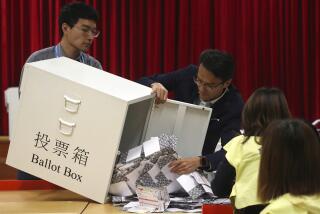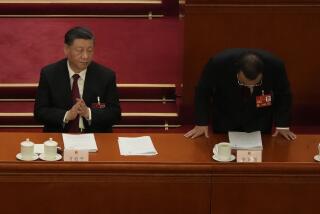China Sees ’97 as Start of Hong Kong’s Democracy
- Share via
HONG KONG — When the Chinese flag is raised here July 1, 1997, Hong Kong will become a far more democratic place than it is today, the senior Chinese representative in this British colony insists.
In a rare interview over the weekend with a group of foreign journalists, Chinese official Zhou Nan said the “one country, two systems” formula that will govern Hong Kong after its return to China next year will provide residents with more control over their fate than they have enjoyed under the British.
“In the 100 years or more history of Hong Kong [that] it has been a colony of Britain, there is some freedom in Hong Kong but no democracy at all,” he said. “It has been under the autocracy of the [British] government. I think Hong Kong’s democracy only has started from this moment--that is to say, Hong Kong’s democracy will start from 1997.”
Zhou pointed to the selection process for Hong Kong’s next chief executive as an example of the colony’s tentative steps toward democracy. Traditionally, the colony’s governor was appointed by the British government, but the three candidates now vying for the position when China takes over have conducted popular campaigns and answered questions on live television about how they would govern Hong Kong.
But despite the pluralist patina, the political process is not exactly democratic. The new chief executive will be selected--not elected--in a process closely guided by China’s control-conscious leaders.
Even the 400 business people and community leaders charged with making the selection were themselves pre-selected by Beijing. The Selection Committee will decide Dec. 11 among the three candidates--among whom shipping magnate Tung Chee-hwa, who has close ties to Beijing, is the front-runner.
Zhou, who as director of the state-owned New China News Agency acts as China’s de facto envoy here, was responding to growing concerns that Communist leaders will meddle in Hong Kong’s affairs despite their agreement to let the territory continue business as usual for 50 years.
Zhou’s comments may seem ironic in light of China’s plans to replace Hong Kong’s elected Legislative Council with a handpicked one after the hand-over. But China has promised that Hong Kong’s 60-member legislature will be democratically elected by 2047.
*
A key question is whether China’s leadership will respect the rights to free speech and a free press, particularly if critical of Beijing. Local business people, while generally optimistic about the survival of Hong Kong’s robust economy, are also worried about corruption or favoritism toward mainland Chinese business interests after the hand-over.
In his comments, Zhou returned to his theme that this unfettered capitalist outpost may have enjoyed many personal freedoms but was hardly a democracy under Britain.
In that context, he likened his role in Hong Kong’s hand-over to that played by America’s revolutionary leaders during the fight for independence. The difference, of course, is that Hong Kong is not gaining its independence but, in China’s eyes, returning to its rightful owner.
“I felt very honored, before concluding my diplomatic career, that I was personally involved in one of the great historical events of Hong Kong, which concerns the sentiments of 1.2 billion Chinese people,” he said.
But Zhou repeatedly emphasized that the colony’s new government, not China, will determine the level of political freedom and economic vitality in Hong Kong as stated in the Basic Law agreed to by China and Britain in 1990.
He said that is why Beijing is so annoyed with Britain’s decision to press forward with legislation designed to clearly define acts of treason, sedition, subversion and secession in post-1997 Hong Kong.
The controversial proposed law, introduced last week in the Legislative Council, was the latest step taken by outgoing British Gov. Chris Patten to ensure that personal freedoms will be maintained in Hong Kong after the hand-over.
Hugh Davies, the chief British negotiator in Hong Kong, said last week that his government could not reach agreement with China on the sensitive issue. Under those circumstances, Britain chose to push forward with legislation to set a benchmark for what will constitute crimes against the Chinese government.
But Zhou, who served in the United States for 10 years as China’s deputy representative to the United Nations, charged that the British government’s effort to pass a law now was an “infringement” on the incoming Hong Kong government’s responsibilities.
“According to the Basic Law, the British side is only responsible for the administration of Hong Kong before July 1, 1997, so I’m wondering why the British Hong Kong government is so enthusiastic about enacting law which will govern Hong Kong after 1997,” he said.
Zhou said it will be up to the future Hong Kong government to define such things as treason and subversion or determine whether the annual June 4 memorial of the bloody 1989 crackdown in Beijing’s Tiananmen Square will be allowed to take place after the hand-over. Earlier, a senior Chinese official had said such gatherings would not be allowed in Hong Kong.
Zhou has developed a reputation as a hard-liner, but in the interview Saturday, the veteran Chinese government official was unusually candid and relaxed. He talked about his friendship with former President Bush and other U.S. leaders he met during his time in New York.
The 69-year-old said he is looking forward to retiring from a 45-year diplomatic career once he has completed what he hopes will be a smooth transition of power.
“My wish is to live a quiet life in Beijing,” he said, “and read the books I’m interested in.”
Times staff writer Maggie Farley contributed to this report.
More to Read
Sign up for Essential California
The most important California stories and recommendations in your inbox every morning.
You may occasionally receive promotional content from the Los Angeles Times.










